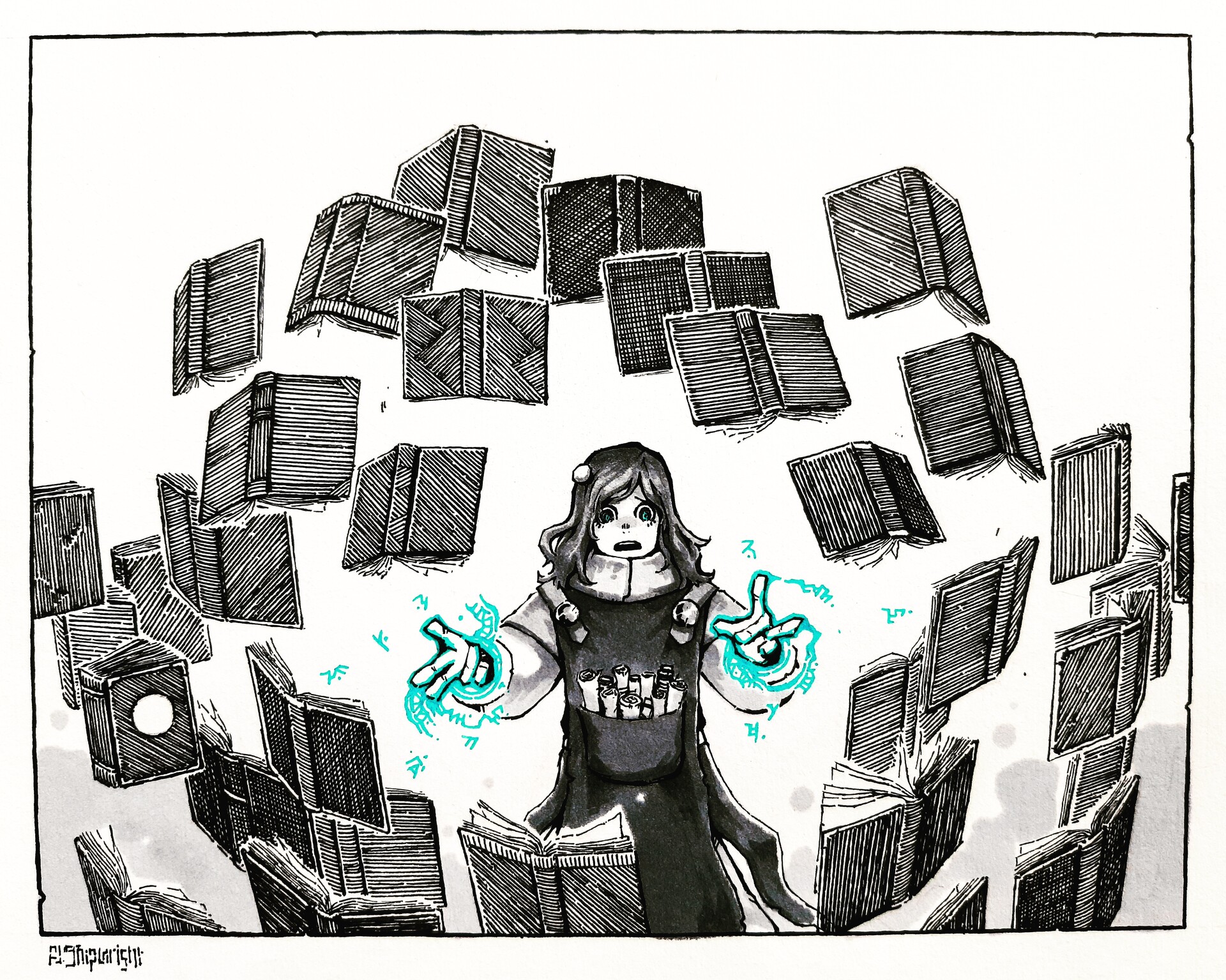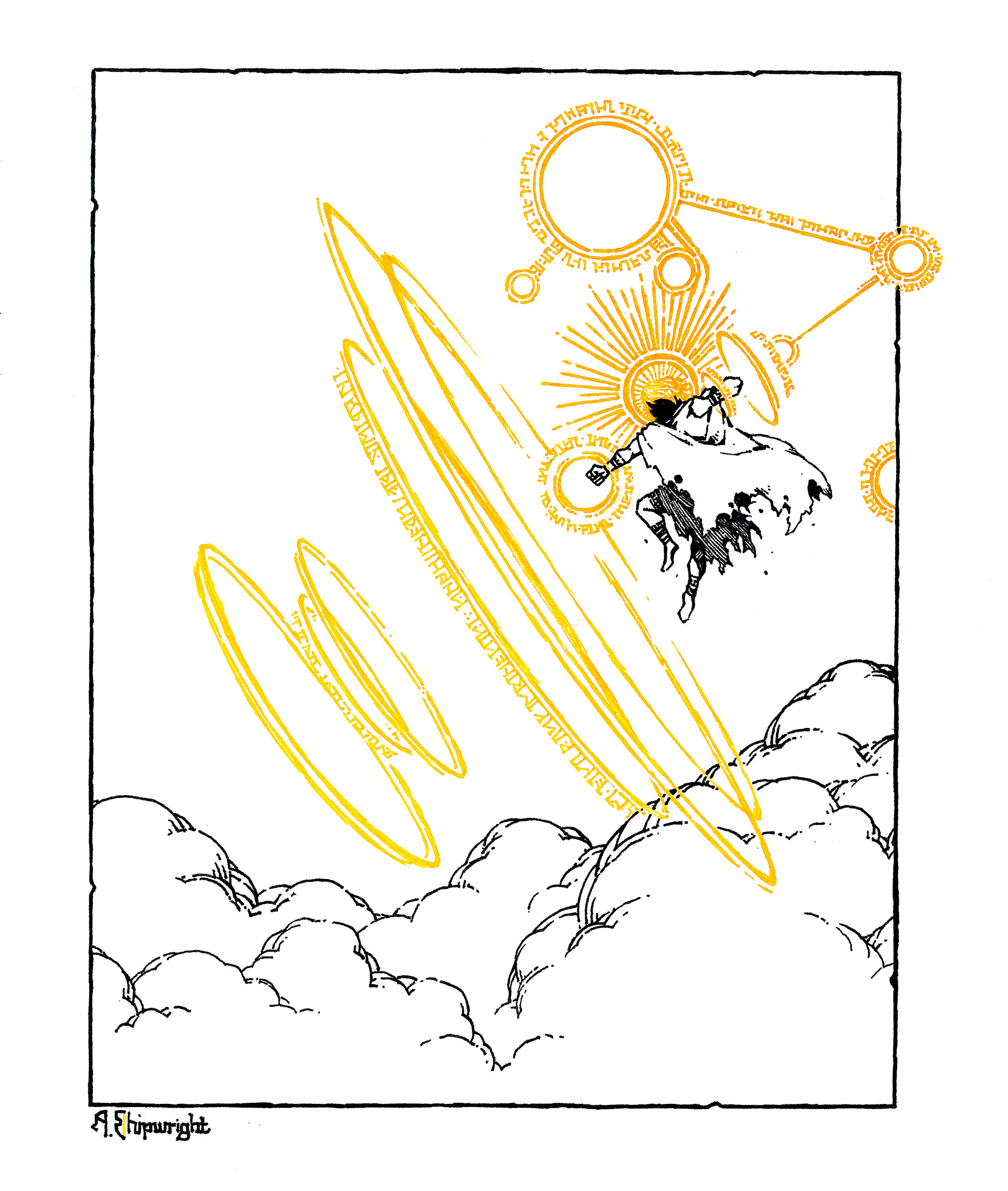Mage (Theous Supplement)
Mage[edit]
About[edit]
Reckless, self-taught spellcasters who skip the years of study or innate talent, and forge their own shortcut to power. |fluff=Through the remains of a camp, a human male walks through the sodden dirt, bandits lining the floor with fiery holes in their stomachs. A dwarf chants over a scroll, as magic runs through the crystal in its hand. An elven female assails her enemies with a motley collection of trinkets and techniques she picked up on her travels.
Mages are often eager and impatient to become the powerful master of the arcane they believe themselves to be. Beginning early, they pursue reckless powers without any official training or restraint, simply picking up bits and pieces of whatever lore and techniques they find appealing. }}
Creating a Mage[edit]
When choosing to be a mage, think about your reasoning. A mage is a spellcaster who rushed through the early onset tutelage of magic and doesn't possess an innate affinity for magic. A mage is a spellcaster who developed a shortcut to magic, so why would someone pursue these techniques? They are most likely a student who just didn't have the time to learn or study or needed power and magic quick without putting in the work. Mages are those with limited to no official instruction, who put them on this path? Were they students of magic before or a street rat that saw a wizard one day?
Want to use magic but don't have the patience? Mages are spellcasters that often don't have the time or patience to prepare spells every day but lack the innate abilities of a sorcerer. By creating a shortcut to actual memorization, they store a limited number of spells in their mind as a sorcerer would, but also keep the spell effectively "prepared" in a focus. This way they only need a small gesture or word to finish the given spell and don't have to keep track of as much knowledge at once, allowing for free time like no wizard will ever know!
Class Features[edit]
As a Mage you gain the following class features.
Hit Dice. 1d6 per Mage level
Hit Points at 1st Level. 6 + your Constitution modifier
Hit Points at Higher Levels. 1d6 (or 4) + your Constitution modifier per Mage level after 1st
Proficiencies
Armor: Light armor
Weapons: Daggers, darts, slings, quarterstaffs, light crossbows
Tools: Choose one
Saving Throws: Choose any two
Skills: Choose any three
Equipment
You start with the following equipment, in addition to the equipment granted by your background:
- (a) a dagger or (b) a quarterstaff
- (a) a dungeoneer’s pack or (b) an explorer’s pack
- an Common arcane focus of your choice
- One common clothes set of your choice, or leather armor
Mage Table[edit]
| Level | Proficiency Bonus | Spells Known | Cantrips Known | Features | Spell Points | Gained Skills |
|---|---|---|---|---|---|---|
| 1st | +2 | 1 | 3 | Spellcasting, Ritual Adept, Magic Aptitude | 1 + Mod | F-Rank |
| 2nd | +2 | 1 | 3 | Chanting, Scholar | 2 + Mod | E-Rank |
| 3rd | +2 | 2 | 3 | Subclass Feature | 4 + Mod | — |
| 4th | +2 | 2 | 4 | Ability Score Improvement | 5 + Mod | E-Rank |
| 5th | +3 | 3 | 4 | Memorize Spell, Quicken Magic | 8 + Mod | D-Rank |
| 6th | +3 | 3 | 4 | Subclass Feature | 10 + Mod | E-Rank |
| 7th | +3 | 4 | 5 | — | 12 + Mod | D-Rank |
| 8th | +3 | 4 | 5 | Ability Score Improvement | 14 + Mod | C-Rank |
| 9th | +4 | 5 | 5 | — | 18 + Mod | D & E-Rank |
| 10th | +4 | 5 | 6 | Subclass Feature | 21 + Mod | C-Rank |
| 11th | +4 | 6 | 6 | — | 24 + Mod | B-Rank |
| 12th | +4 | 6 | 6 | Ability Score Improvement | 24 + Mod | D & C-Rank |
| 13th | +5 | 7 | 7 | — | 27 + Mod | B-Rank |
| 14th | +5 | 7 | 7 | Subclass Feature | 27 + Mod | A-Rank |
| 15th | +5 | 8 | 7 | — | 31 + Mod | C & B-Rank |
| 16th | +5 | 8 | 8 | Ability Score Improvement | 31 + Mod | A-Rank |
| 17th | +6 | 9 | 8 | Subclass Feature | 36 + Mod | — |
| 18th | +6 | 9 | 8 | Spell Mastery | 38 + Mod | B & A-Rank |
| 19th | +6 | 9 | 9 | — | 41 + Mod | — |
| 20th | +6 | 9 | 9 | Signature Spell | 45 + Mod | A & S-Rank |
Level 1 Spellcasting[edit]
As a student of arcane magic, you have learned to cast spells. See Spellcasting for the rules on spellcasting. The information below details how you use those rules with your spells.
Cantrips. You know Three F Rank Spells of your choice. Light, Mage Hand, and Arcane Bolt are recommended. Whenever you finish a Long Rest, you can replace one of your F Rank Spells from this feature with another of your choice. When you reach Mage levels 4 and 10, you learn another cantrip of your choice, as shown in the Cantrips column of the Mage Features table.
Spellbook. Your apprenticeship culminated in the creation of a unique book: your spellbook. It is a Tiny object that weighs 3 pounds, contains 100 pages, and can be read only by you or someone casting Identify. You determine the book’s appearance and materials, such as a gilt-edged tome or a collection of vellum bound with twine. The book contains the level 1+ spells you know. It starts with six level 1 Mage spells of your choice. Detect Magic, Feather Fall, Mage Armor, Magic Missile, Sleep, and Thunderwave are recommended. Whenever you gain a Mage level after 1, add two Mage spells of your choice to your spellbook.
Prepared Spells of Level 1+. You prepare the list of level 1+ spells that are available for you to cast with this feature. To do so, choose four spells from your spellbook. The chosen spells must be of a level for which you have spell slots. The number of spells on your list increases as you gain Mage levels, as shown in the Prepared Spells column of the Mage Features table.
Changing Your Prepared Spells. Whenever you finish a Long Rest, you can change your list of prepared spells, replacing any of the spells there with spells from your spellbook.
Spellcasting Focus. You can use an Arcane Focus or your spellbook as a Spellcasting Focus for your spells.
Spellcasting Ability. At first level you can choose whatever your spellcasting ability will be from the list of Wisdom, Charisma, Intelligence. For example, if you use Charisma as your spellcasting ability for your Mage spells, you use your Charisma whenever a spell calls for your spellcasting ability.
Spell save DC = 8 + your proficiency bonus + your Spellcasting modifier Spell attack modifier = your proficiency bonus + your Spellcasting modifier
Level 1 Ritual Adept[edit]
You can cast any spell as a Ritual if that spell has the Ritual tag and the spell is in your spellbook. You needn’t have the spell prepared, but you must read from the book to cast a spell in this way.
Level 1 Magical Aptitude[edit]
Now at 1st Level, After you roll for how much Magical Affinity you start with. You can choose to start with 3 Elements Instead.
Elemental Affinity. Whenever you choose to be a mage, you may roll a 1d100 in front of your DM to decide what elemental affinity(s) you are born with. Alternatively, you're free to choose what affinity you want upon approval of your DM. Whatever elemental affinity you gain, you can only cast spells of that affinity.
Level 1 Arcane Recovery[edit]
You can regain some of your magical energy by studying your spellbook. When you finish a Short Rest, you can choose to recover Spell Points. If you do, then you regain 2 + half your Mage level in spell points.
Once you use this feature, you can’t do so again until you finish a Long Rest.
Level 2 Chanting[edit]
The art of chanting and incantation is essential to being a mage. It allows you to enhance your spells through ritualistic speech and focused invocation.
Invoking a Chant. As an Action you select one spell from your available spells and begin chanting it. The next time you cast that spell within the next two turns, it gains two benefits of your choice from the list below:
- The spell ignores resistances and treats immunities as resistances.
- The range, radius, or area of effect doubles.
- The range, radius, or area of effect triples (requires the double effect to be applied first).
- Targets making a saving throw against the spell roll at disadvantage, and the DC increases by your proficiency bonus.
- If the spell requires an attack roll, you roll with advantage and may add your proficiency bonus an extra time.
- The spell does an extra die of damage. (You can take this multiple times.)
- The spell ignores all forms of cover; however, you are still required to know the space of the creature to target.
- The spell's area changes to a Cone, Line, Square (cannot be a single target effect).
- The spell’s duration is doubled.
- The spell’s duration is tripled (requires the doubled duration to be applied first).
- If the spell deals damage via a saving throw, it ignores abilities such as Evasion if the target fails the save by 5 or more (requires Complex Chanting).
- If the spell forces a creature to make a saving throw, they must roll three dice and take the lowest result (requires Complex Chanting).
- If the spell requires an attack roll, you may roll three dice and take the highest result (requires Complex Chanting).
Sustained Chanting. For each subsequent turn you continue chanting as an action, you may apply two additional bonuses of your choice. A single spell may only benefit from 1 + your Intelligence, Wisdom, or Charisma modifier in total bonuses (minimum of 1).
Complex Chanting. Instead of chanting as an action, you may perform an advanced version using intricate hand signs and precise recitations as a Full Round Action. When doing so:
- You may apply four benefits from the above list instead of two.
- For each subsequent turn spent chanting, you may apply four more benefits instead of two.
Maintaining Focus. While Chanting, you must maintain concentration as if concentrating on a spell. If you lose concentration, the chant is lost.
Limitations.
- If the spell involves multiple attack rolls, saving throws, or areas of effect, you may only apply a chosen benefit to one instance per casting.
- Chanting cannot be used on spells with the Wish-like effect.
- You cannot ready an action for Chanting.
- You cannot cast spells while chanting.
Level 2 Scholar[edit]
While studying magic, you also specialized in another field of study. Choose one of the following skills in which you have proficiency: Arcana, History, Investigation, Medicine, Nature, or Religion. You have Expertise in the chosen skill.
Level 3 Mage Subclass[edit]
You gain a Mage subclass of your choice. The available subclasses are detailed after this class’s description. A subclass is a specialization that grants you features at certain Mage levels.
Level 4 Ability Score Improvement[edit]
When you reach 4th level, and again at 8th, 12th, and 16th level, you can increase one ability score of your choice by 2, or you can increase two ability scores of your choice by 1. As normal, you can't increase an ability score above 20 using this feature.
However, you can choose to gain 1 Skill of your choice that you meet the prerequisite rank of through Skill Aptitude.
Level 5 Memorize Spell[edit]
Whenever you finish a Short Rest, you can study your spellbook and replace one of the level 1+ spells you have prepared for your Spellcasting feature with another level 1+ spell from the book.
Level 5 Maximize Magic[edit]
When you cast a spell that deals damage associated with your elemental affinity, you can choose to instead of rolling take the maximum of all damage dice.
You can use this feature once per long rest. At 17th level, you can use this feature an additional time.
Level 18 Spell Mastery[edit]
You have achieved such mastery over certain spells that you can cast them at will. Choose a level 1 and a level 2 spell in your spellbook that have a casting time of an action. You always have those spells prepared, and you can cast them at their lowest level without expending a spell slot.
To cast either spell at a higher level, you must expend a spell slot. Whenever you finish a Long Rest, you can study your spellbook and replace one of those spells with an eligible spell of the same level from the book.
Level 20 Signature Spells[edit]
Choose two level 3 spells in your spellbook as your signature spells. You always have these spells prepared, and you can cast each of them once at level 3 without expending a spell slot. When you do so, you can’t cast them in this way again until you finish a Short or Long Rest.
To cast either spell at a higher level, you must expend a spell slot.
Subclasses[edit]
Mana Prodigy[edit]
 To what takes others years, it takes you days. A prodigy is more than just a quick learner.
To what takes others years, it takes you days. A prodigy is more than just a quick learner.
- Voiceless Incantation
At 3rd level, you are able to cast a spell faster than any other. When you use the chanting feature, it now only takes a bonus action to activate and an action to do complex chanting. Additionally, you are no longer required to use a verbal component to cast a spell. You cannot chant twice in one turn with this feature. Additionally, when you chant using this feature, you lose the increased damage die option.
- Dual Casting
At 6th level, like an artist painting on two different canvases at the same time, it may seem impossible—but you’ve found a way to do it. You can now cast spells while chanting. Additionally, you can now bypass the one leveled spell per turn rule while chanting.
- Higher Understanding
At 10th level, two forms of magic are simply not enough—your understanding increases to an even greater level. You gain two additional elements. However, if you already have seven or eight elements, then you can instead take one A-rank skill or lower.
- Arcane Convergence
At 14th level, your mind is a symphony of magical threads, effortlessly weaving spells together with unparalleled clarity. Once per turn, when you cast a spell, you can also cast a cantrip or F-Rank spell as part of the same action. This second spell must target a different creature or area than the original spell, and must not have a casting time greater than one action.
You can use this feature a number of times equal to your Intelligence, Wisdom, or Charisma modifier (your casting stat). You regain all uses on a long rest.
- Apex Synapse
At 17th level, your mastery of spell theory is so refined that reality bends to your whim. When you cast a spell using Chanting, you may choose three additional effects instead of two (or six total if using Complex Chanting). Additionally, your maximum number of chanting bonuses is increased by 2 (for example, 1 + INT mod becomes 3 + INT mod).
Evocation Mage[edit]
Some mages crave versatility, and others chase esoteric power—but not you. You seek destruction. As an Evocation Mage, you refine and amplify your spells to a terrifying degree, wielding raw elemental force like a sculptor does a chisel. Where others see collateral, you see canvas. Where others hold back, you strike with decisive, overwhelming force. Your magic doesn't just burn—it obliterates.
- Potent Casting
At 3rd level, you burn away your own life force to make your spells even stronger.
Whenever you cast a spell that deals damage, you can choose to spend one or more Hit Dice. Roll the dice and add the result to the spell’s damage. For example, if you cast fireball and spend three Hit Dice (d6), you deal an additional 3d6 fire damage.
This decision must be made before the spell is cast. You do not regain Hit Dice spent this way until you finish a long rest.
- Controlled Detonation
At 6th level, precision is the true mark of mastery. Your power spares those you wish to protect.
When you cast an evocation spell that affects other creatures you can see, you can choose a number of them equal to 1 + the spell’s level. The chosen creatures automatically succeed on their saving throws against the spell, and if the spell would deal half damage on a successful save, they instead take no damage.
- Arcane Efficiency
At 10th level, you've refined your spellcasting to its most potent edge.
Whenever you cast a spell from the School of Evocation, you can add your Chosen Spellcasting Modifier to one of the spell’s damage rolls.
- Arcane Overload
At 14th level, when subtlety fails, unleash everything.
When you cast a Mage spell of 1st to 5th level that deals damage, you can choose to deal maximum damage with that spell. The first time you do this between long rests, you suffer no adverse effects.
If you use this feature again before finishing a long rest, you take 2d12 necrotic damage per level of the spell slot used, immediately after casting the spell. This damage ignores resistance and immunity.
Each additional time you use this feature before completing a long rest, the necrotic damage per spell level increases by 1d12 cumulatively.
- Ultimate Attack
At 17th level, who needs versatility when you can end everything in one hit?
Choose one damaging spell of A-rank or lower. This spell becomes your Ultimate Attack. When casting this spell, you can declare it as your Ultimate Attack. When you do, it deals additional damage Dice equal to your Mage level. The damage type is the same as the spell casted.
After using your Ultimate Attack, you immediately gain two levels of exhaustion.
Type Specialty[edit]
Some mages spend their entire lives trying to master every kind of magic. You’ve chosen a different path—devotion. Rather than spreading your knowledge thin, you’ve focused it entirely on one elemental affinity. In doing so, you’ve unlocked its deepest truths, casting spells of a caliber few thought possible.
Prerequisite – You must only know one kind of elemental affinity to take this subclass. You may forgo any number of affinities you currently know in order to qualify.
Note – Once you take this subclass, you cannot gain any additional elemental affinities.
- Type Superiority
At 3rd level, only knowing one type of magic has taught you flexibility, precision, and raw power.
Whenever you cast a spell of your affinity, you deal an extra number of damage dice equal to your proficiency bonus (maximum die size: d8). For example, if your proficiency bonus is +4, you add 4d8 extra damage of the same elemental type.
Even though you possess only one affinity, you gain access to one full spell list of your choice. If this is different from the spell list you initially chose when you became a Mage, the new list replaces the old one.
You also gain the Elemental Adept feat for your chosen element.
- Type Zone
At 6th level, your mastery of your element allows you to bend the environment around you, creating a space of pure elemental empowerment.
As a bonus action, you may spend 2 Spell Points to create a 10-foot radius zone centered on a point within 5 feet of you. The zone lasts for 1 minute or until you create a new one. While in this zone:
- Any spell cast that matches your elemental affinity gains a bonus to its damage equal to the caster's proficiency bonus.
- The range of spells with the same element is increased by 30 feet, if applicable.
- This zone affects both your spells and those of allies who share your affinity.
- Type Efficiency
At 10th level, your connection to your element allows you to cast with less effort.
Whenever you cast a spell of your elemental affinity, reduce its Spell Point cost by half your proficiency bonus, rounded down (minimum of 1).
- Type Advantage
At 14th level, you've studied your element to the point where your strikes exploit even the smallest weaknesses.
If a creature has vulnerability to your elemental affinity, your spell deals triple damage instead of double.
- Ultimate Element
At 17th level, you have reached the apex of elemental power—your magic reshapes the battlefield itself.
As an action, you may unleash an Elemental Cataclysm, a manifestation of your chosen affinity so overwhelming it defies conventional spell limits. Choose a spell of your affinity that you know. It must be of 5th level or lower. When you cast it using this feature:
- The spell’s area of effect is tripled.
- The spell deals maximum possible damage.
- Creatures affected by the spell must make a Constitution saving throw (DC = your Spell Save DC) or be stunned until the end of their next turn.
Once you use this feature, you cannot do so again until you finish a long rest.
Back to Main Page → 5e Homebrew → Campaign Settings → The World of Theous → Classes


